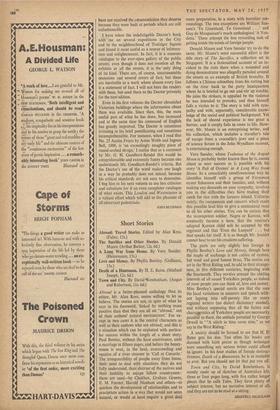Short Stories
Abroad: Travel Stories. Edited by Alan Ross. (Faber, 15s.) The Sacrifice and Other Stories. By Donald Moore. (Arthur Barker, 12s. 6d.) A Long Way from Home. By Vern Sneider. (Heinemann, 15s.) Love and Money. By Phyllis Bentley. (Gollancz, 15s.) Abroad is a better-planned anthology than its editor, Mr. Alan Ross, seems willing to let us believe. The stories are not, in spite of what he says in his foreword, 'linked by nothing more positive than that they are all set "abroad," out of their authors' natural environment.' For ex- cept in two cases it is the central characters as well as their authors who are abroad; and this is a situation which can be exploited with particu- lar success within the length of a short story. Paul Bowles, without the least contrivance, ends a marriage in fifteen pages, and before the honey- moon is over, in the heat, overcrowding and squalor of a river steamer in 'Call at Corazon.' The irresponsibility of people away from home, their need to deal with situations they do not fully understand, their: distrust of the natives and their inability to es ape fellow countrymen : these are used—by Chekhov, Graham Greene, E. M. Forster, Harold Nicolson and others—to quicken the development of relationships and to precipitate action in a way that would not seem natural, or would at least require a great deal more preparation, in a story with homelier sur- roundings. The two exceptions are William San- som's 'To Greenland, To Greenland . . .' and Guy de Maupassant's much anthologised 'A Ven- detta.' These attempt the less rewarding task of getting inside the minds of foreign people.
Donald Moore and Vern Sneider try to do the same. Mr. Moore's most successful effort is the title story of The Sacrifice, a collection set in Singapore. It is a fictionalised account of an in- cident in the riots there when a wounded and dying demonstrator was allegedly paraded around the streets as an example of British brutality. It follows a Chinese schoolboy from his rotting but on the river bank to the party headquarters where he is briefed to go out and stir up trouble. He joins the strikers, is appalled by the violence he was intended to provoke, and then himself falls a victim to it. The story is told with sym- pathy and with, apparently, considerable know- ledge of the social and political background. Yet the lack of shared experience is too great a barrier, and it simply fails to come to life. How- ever, Mr. Moore is an enterprising writer, and his collection, which includes a traveller's tale of escape from a crocodile's jaws and a piece of science fiction in the John Wyndham manner, is entertaining enough.
Vern Sneider, whose Teahouse of the August Moon is probably better known than he is, comes about as near success as is possible with his story 'A Pail of Oysters' in A Long Way from Home. In a remarkably unselfconscious way he identifies himself with a group of Formosan oyster fishermen and their families, and, without making any demands on your sympathy, involves you in the difficulties they have trading their catch for rice with the farmers inland. Unfortu- nately, the compassion and concern which made this possible lead him to give a sentimental twist to all his other stories. You can be certain that the incompetent soldier, Negro or Korean, will eventually become a hero, that the veteran's adopted Korean child will be accepted by the regiment and that 'Even the Leopard' . .,. but that speaks for itself. It is as though Mr. Sneider cannot bear to see his creations suffering.
The parts are only slightly less foreign in Phyllis Bentley's Love and Money, though here the staple of exchange is not catties of oysters, but wool and good honest brass. The stories are set in the West Riding and, to add to their strange- ness, ,in five different centuries, beginning with the fourteenth. They revolve around the abiding interests of all sound Yorkshire people, as indeed of most people you can think of, love and money. Miss Bentley's special merits are that she uses the local variations in manners and speech with- out lapsing into self-parody like so many regional writers (no dialect dictionary needed), and without supposing that all the habits and characteristics of Yorkshire people are necessarily peculiar to them, the attitude parodied by George Orwell in ' "A stitch in time saves nine," as we say in the West Riding.'
A society should be formed to see that H. E: Bates gets his due. Too often his books are damned with faint praise as though technique were something any serious writer could afford to ignore. In his four studies of female destruc- tiveness, Death of a Huntsman, he is as readable as ever. But you should not let that put you off.
Town and City, by David Rowbotham, is mostly made up of sketches of Australian life, three or four pages long, with five rather longer pieces that lie calls Tales. They have plenty of subject interest, but no narrative interest at all, and they are not to be read at a sitting.
GEOFFREY NICI1OLSON






























 Previous page
Previous page